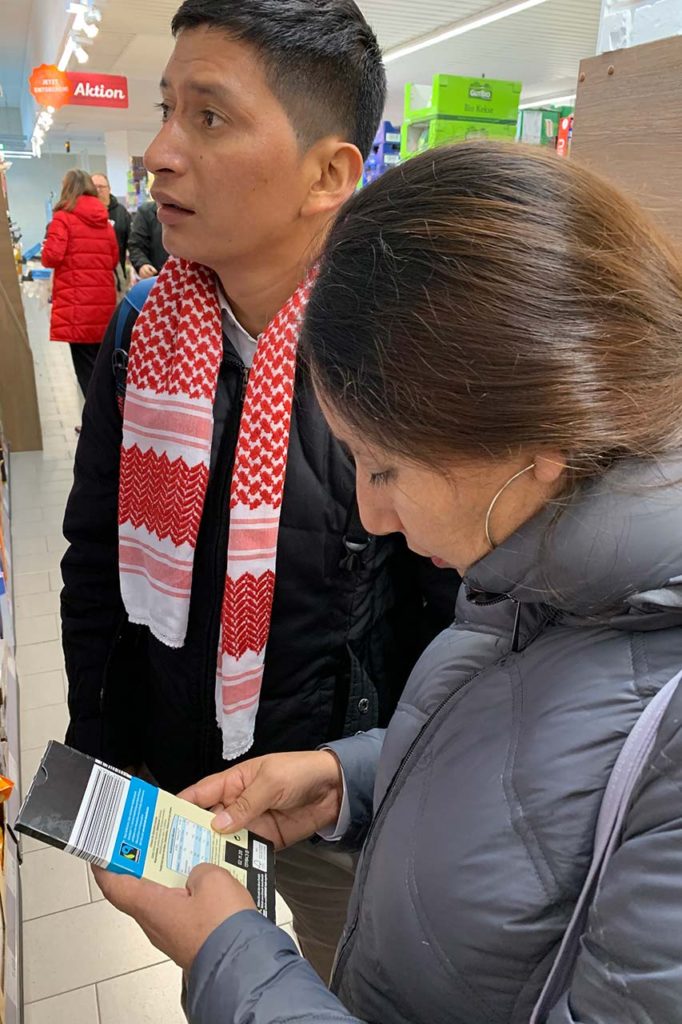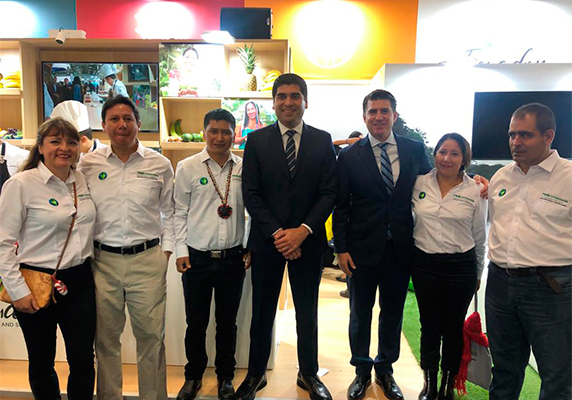
Berlin, February 05 to 07.- Ecuador participated in the Fruit Logistica 2020 international fair, one of the most important agri-food fairs in the world. Ecuador co-hosted the event this year, which brought together 3,300 exhibitors and more than 72,000 visitors from around the world, showing foreign markets the high-quality and sustainable production of crops produced in the Ecuadorian Sierra, Coast and Amazon.
38 companies and 11 small producers from Ecuador were present during the three days of the fair. Products such as bananas, plantains, grapefruit, pitahayas, mangoes, tree tomatoes, pineapples, berries, passion fruit, avocadoes, soursop, broccoli, roses, potatoes, cocoa, coffee and oil palm were exhibited. The products most popular with the international community included coffee, cocoa and palm oil certified by the Roundtable on Sustainable Palm Oil (RSPO, for its acronym in English).
The participation of five associations was supported by the Program for Conservation and Sustainable Production – PROAmazonía, which is an initiative of the Ministry of Environment (MAE) and the Ministry of Agriculture and Livestock (MAG), supported by the United Nations Development Program (UNDP) and financed by the Green Climate Fund (GCF) and the Global Environment Facility (GEF).
The producer associations, APEOSAE, ASOSUMACO, WIÑAK, ASOPALORA and Organic Supply attended the event to explore business partnerships and demonstrate that it is possible to have sustainable, deforestation-free production. Ministers Xavier Lazo, head of the Ministry of Agriculture and Livestock and authorities from the Ministry of Environment also attended the meeting.
Nora Ramón, of APEOSAE, an association that produces cassava, bananas, oranges, oregano, guavas, chili pepper, thyme, coffee and cocoa explained that her organization exports to Germany, France and the United States, but they hope, in the near future, to eliminate the intermediaries and export directly to supermarkets. As an association, they are interested in finding buyers who invest in the long term to be able to put together a production plan with farming families, mainly women from Zamora Chinchipe province. “What we want is real fair trade, that is, without intermediaries, and for the highest possible income to go to the producer’s pocket,” commented Nora.
Ecuador has demonstrated that it can achieve sustainable, deforestation-free, low-carbon agricultural livestock production. In its efforts to reduce vulnerability to climate change, it has incorporated agroforestry systems on farms that conserve the soil and it has strengthened the skills of producers. This is part of the Government’s ‘Premium and Sustainable’ strategy. This Initiative facilitates the generation of net profits and the reduction of economic, environmental and social costs, and also incorporates technology and innovation to achieve increased competitiveness. ‘Premium and Sustainable’ is supported by five pillars: modern cooperativism; empowerment of women and rural youth; deforestation-free production; productivity, quality and traceability; and zero rural poverty.
The producers took advantage of their stay in Berlin to carry out market research activities. They visited supermarkets to assess trends in the consumption of sustainable, deforestation-free products, and exchanged experiences with other exhibitors at the event. An agenda was also promoted with specialty coffee importers from Hamburg. For example, Interamerican Coffee, one of the largest coffee importers in Germany, and a specialty coffee shop, Kaffeerosterei, were contacted.
On the last day of the fair, PROAmazonía and the producers visited Café Quijote, a German company that promised to increase its coffee purchases from ASOSUMACO, which is a great business opportunity with the European market.
During his stay, Wilson Yánez from ASOSUMACO explained “We produce a crop that respects the environment and we take advantage of all its resources.” The farmers in this association have re-evaluated the cultivation of Robusta coffee and have abandoned the traditional way of carrying out this productive activity. The members of the association are all committed to quality and respect for forests. This has allowed them to produce efficiently, and in their second year they earned $600,000.
One of the most important meetings that took place at the Fruit Logistica Fair was held by Marcos Grefa, representative of WIÑAC, an association that grows and exports coffee and guayusa. He met with Sebastián Freidank, a German importer who purchased samples of his products several months ago. During their meeting they discussed the evaluation of his samples and the possible purchase of guayusa. “It has very high quality. Customers who tried it are delighted. They like it a lot and all want to buy more,” he said.
Participating in Fruit Logistica 2020 was very important and has generated great learning for the Amazonian producers of Ecuador who were invited to the fair with the support of PROAmazonía. They were able to exchange knowledge with other producers, study existing supply and demand, and above all, gain a vision of the multiple possibilities offered by the international market.
Some associations, such as ASOSUMACO, made deals and their sales were three times higher than what they currently export. These past months, PROAmazonía and the producers have strengthened their sustainable, deforestation-free production practices to finalize new purchase orders and contribute to the quality of life of Producer Associations of the Ecuadorian Amazon.
 Español
Español English
English

Comments are closed.